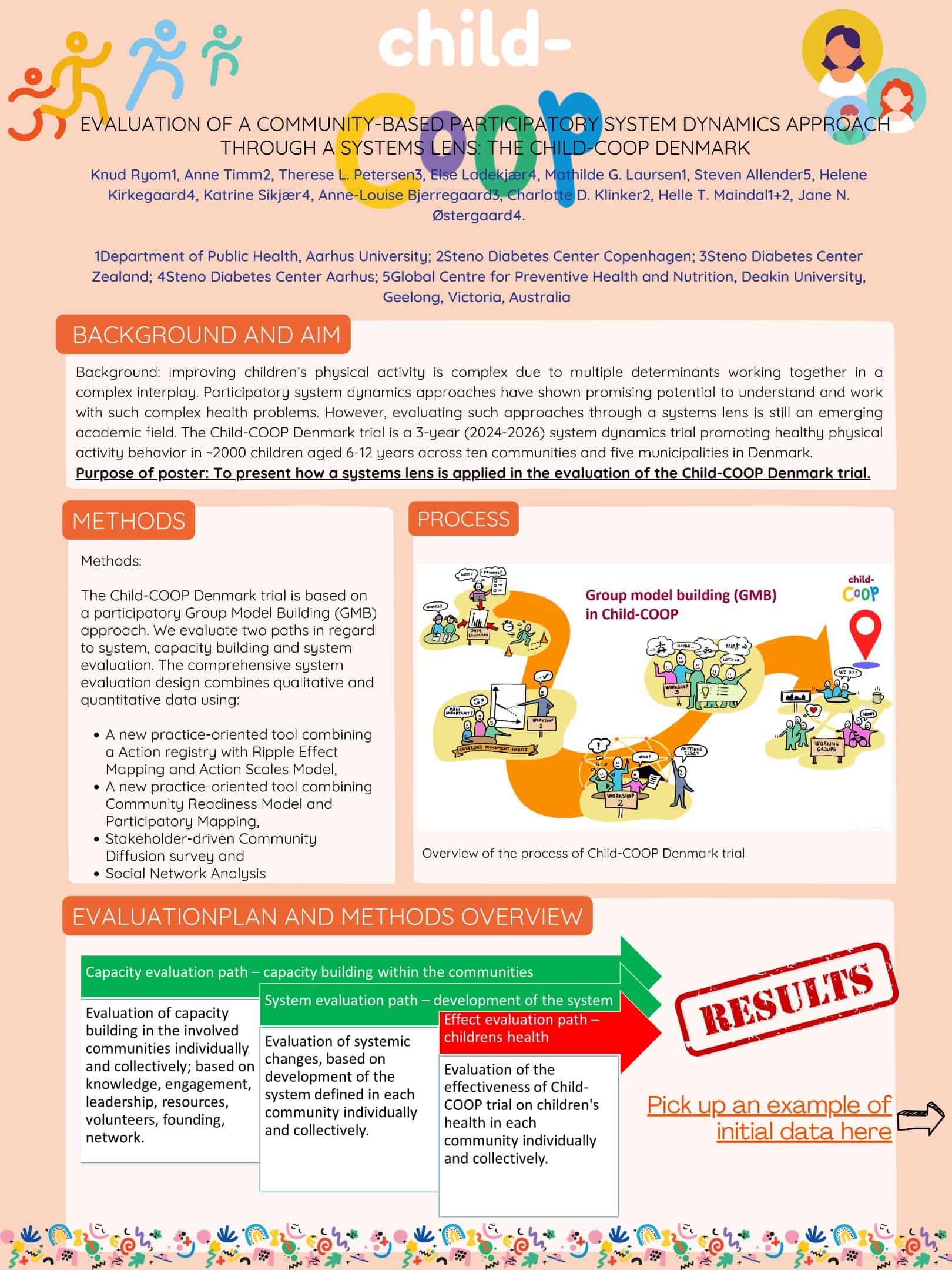
Evaluation of a community-based participatory system dynamics approach through a systems lens: the Child-COOP Denmark
Abstract Overview
Background: Improving children’s physical activity is complex due to multiple determinants working together in a complex interplay. Participatory system dynamics approaches have shown promising potential to understand and work with such complex health problems. However, evaluating such approaches through a systems lens is still an emerging academic field.
Purpose: To present how a systems lens is applied in the evaluation of the Child-COOP Denmark trial.
Methods: The Child-COOP Denmark trial is a 3-year system dynamics trial promoting healthy physical activity behaviour in ~2000 children aged 6-12 years across ten communities and five municipalities in Denmark. The Child-COOP Denmark trial is based on a participatory Group Model Building (GMB) approach. The comprehensive system evaluation design combines qualitative and quantitative data using a) a new practice-oriented tool combining Ripple Effect Mapping and Action Scales Model, b) qualitative Community Readiness assessment, c) Stakeholder-driven Community Diffusion survey, d) Social Network Analysis and e) Participatory Mapping.
Results and practical implications: We will present the design and methods of the system evaluation as well as baseline results from the Participatory Mapping and Community Readiness assessment (data collected spring 2024). While we also discuss implications and potential of our overall evaluation approach within participatory system dynamics approaches. System Level Evaluations generates data that on how practice work and navigate complex health problems and once returned to practice may give directions on how to improve their work in the applied area of work.
Conclusion: System level evaluations are still an emerging field within public health. Thus, it is important to share design and methods to stimulate knowledge sharing and collaboration across the academic field to ensure standardization.
Funding: This study received funding from Novo Nordisk Foundation.

Additional Authors
Name: Anne Timm
Affiliation: Steno Diabetes Center Copenhagen, Denmark
Presenting Author: yes
Name: Therese L. Petersen
Affiliation: Steno Diabetes Center Zealand, Denmark
Presenting Author: no
Name: Else Ladekjær
Affiliation: Steno Diabetes Center Aarhus, Denmark
Presenting Author: no
Name: Mathilde Grøn Laursen
Affiliation: Department of Public Health, University of Aarhus, Denmark
Presenting Author: no
Name: Steven Allender
Affiliation: Global Centre for Preventive Health and Nutrition (GLOBE), Institute for Health Transformation, School of Health and Social Development, Deakin University, Geelong, Victoria, Australia
Presenting Author: no
Name: Helene Kirkegaard
Affiliation: Steno Diabetes Center Aarhus, Denmark
Presenting Author: no
Name: Katrine Sikjær
Affiliation: Steno Diabetes Center Aarhus, Denmark
Presenting Author: no
Name: Anne-Louise Bjerregaard
Affiliation: Steno Diabetes Center Zealand, Denmark
Presenting Author: no
Name: Charlotte Demant Klinker
Affiliation: Steno Diabetes Center Copenhagen, Denmark
Presenting Author: no
Name: Helle Terkildsen Maindal
Affiliation: Department of Public Health, University of Aarhus, Denmark
Presenting Author: no
Name: Jane Nautrup Østergaard
Affiliation: Steno Diabetes Center Aarhus, Denmark
Presenting Author: no
